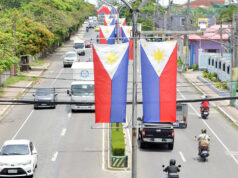US reaffirms position in South China Sea code negotiations
By Camille A. Aguinaldo
The United States made clear its position that the Code of Conduct on the South China Sea should also include the concerns and rights of third parties during its meetings with Southeast Asian foreign ministers in Singapore.
In a teleconference on Tuesday with reporters, US Mission to ASEAN Charges d’Affaires Piper Campbell said US Secretary Michael R. Pompeo raised the matter in all meetings during the Association of Southeast Asian Nations (ASEAN) Ministerial Meetings in Singapore.
“The Secretary in both his bilateral meetings, including China, Japan, Australia, the ASEAN member states and then in the meeting themselves, had numerous opportunities to make clear the consistent US position on the South China Sea including our belief that any Code of Conduct needs to incorporate the concerns and the rights of third parties,” she said.
Ms. Campbell said the US also stressed that no country should pressure other countries in the CoC negotiations.
“It’s important that all countries, regardless of their size, have the opportunity to represent their national interests as well as the very clear international principles including the principles that are enshrined in UNCLOS (United Nations Convention on the Law of the Sea). So we continue to be consistent in the US position about the DoC (Declaration of Conduct of Parties in the South China Sea) and the CoC. That position is unchanged,” she said.
Previous reports indicated that China suggested military and energy explorations with Southeast Asian nations in South China Sea, based on a draft CoC document. China also stressed that countries outside the region, such as the US, should be excluded in the proposed activities.
ASEAN and China have arrived at a single draft CoC, Singaporean Foreign Minister Vivian Balakhrishnan earlier said.
Sought for comment by reporters in a press briefing on Tuesday regarding the details of the CoC, Foreign Affairs Alan Peter S. Cayetano refused to divulge information, noting that “diplomatic space” is needed for ASEAN member states to negotiate.
He however expressed optimism with the Philippines taking over as country coordinator in the ASEAN-China negotiations.
“We’re going to wear more than two hats in this occasion. There’s going to be a lot faith in us — because we’re also claimant states — that we will not be one-sided,” he said.
He also noted the importance of the CoC given that the South China sea region has became major security concern around the world since it has also become a venue for regional rivalries.
“If we have a CoC and it’s effective, effective means it’s implemented well, everyone is doing their best and possibly that there will be enforcement mechanism, then you know it will give us stability and open doors for peaceful cooperation,” he said.
WORKING WITH CHINA
Mr. Cayetano also said President Rodrigo R. Duterte has approved his request to form a technical working group tasked to formulate the framework agreement of the proposed oil and gas exploration with China in South China Sea.
“Our discussion with oil and gas are progressing quite well. Last night I asked the President if I can form already the working group and he approved it,” he said.
The group may compose of experts in the Cabinet level from the Department of Environment and Natural Resource (DENR), Department of Energy (DoE), National security Adviser, National Intelligence Coordinating Agency (NICA), Department of Defense (DND), and Department of Interior and Local Government (DILG), according to Mr. Cayetano.
He also wanted the legal team for the technical working group from the Department of Justice, the office of the Solicitor General, and a group of advisors tasked to advise the Philippine government and to help in the negotiations. The legal team will also be composed of experts on oil and gas, constitutional law, and the United Nations Convention on the Law of the Sea (UNCLOS).
He said China is working with its own technical working group as well on the proposed joint exploration.
He added that the actual contract negotiations may be left with private entities. He said the Philippine government’s role is to provide the framework for the agreement.
“It will be a commercial venture. I think that’s a smarter thing to do. As I said, these are preliminary talks but as of now, there’s no plan from the Philippine government side to directly invest in oil and gas,” he said.
He said the Philippines is negotiating for a similar or better deal with the Malampaya natural gas project in the joint exploration in South China Sea.
The Malampaya project is a joint undertaking of the national government and the private companies Shell Philippines Exploration B.V. on behalf of joint venture partners Chevron Malampaya LLC and PNOC Exploration Corp.
Mr. Cayetano said the proposed joint exploration with China is an urgent matter for the government given that the Malampaya gas find is expected to run out by 2024.
“Can you imagine the prices of energy and power if we have to import gas? We are taking our responsibilities very seriously in providing for future Filipino generations. And if there are living and nonliving resources in the West Philippine Sea, South China Sea, and we can come up with a framework that is win-win-win why not?” he said.
As for his disagreement with former President Benigno S.C. Aquino III, Mr. Cayetano reiterated his appeal for him to be part of the national debate and to shed light on his administration’s approach to the South China sea dispute.
He also wanted Mr. Aquino to provide alternatives after criticizing the foreign policy of the Duterte administrtion.
“I think it’s very important for our discussion and for the issue and policy to be clear to our people that you actually answer the questions. If you don’t think I’m the right person to be accountable to, then it can be the Senate, it can be the media but I think we need answers to these questions,” he said.
“I think it’s a disservice to the Filipino people to just say Google it,” he added.



